Our website is made possible by displaying online advertisements to our visitors.
Please consider supporting us by disabling your ad blocker.
Phillip Sharp
Phillip Sharp | |
|---|---|
 Phillip Sharp with George W. Bush National Medal of Science awards 2006. | |
| Born | June 6, 1944 |
| Nationality | American |
| Alma mater | University of Illinois at Urbana-Champaign |
| Spouse | Ann Holcombe |
| Awards | Nobel Prize in Physiology or Medicine (1993), National Medal of Science (2004) |
| Scientific career | |
| Fields | Biologist |
| Institutions | Caltech Cold Spring Harbor Laboratory MIT |
| Doctoral students | Andrew Fire |
Phillip Allen Sharp (born June 6, 1944) is an American geneticist and molecular biologist.
He co-discovered gene splicing, and shared the 1993 Nobel Prize in Physiology or Medicine with Richard Roberts for "the discovery that genes in eukaryotes are not contiguous strings but contain introns, and that the splicing of pre-messenger RNA to delete those introns can occur in different ways, yielding different proteins from the same DNA sequence".
Sharp was born in Falmouth, Kentucky. He completed his PhD in chemistry at the University of Illinois at Urbana-Champaign in 1969. After completing his PhD he worked at the California Institute of Technology until 1971, where he studied plasmids and, later, gene expression in human cells at the Cold Spring Harbor Laboratory under James Watson.
In 1974 he was offered a position at MIT by biologist Salvador Luria. He was director of MIT's Center for Cancer Research (now the Koch Institute for Integrative Cancer Research) from 1985 to 1991; head of the Biology department from 1991 to 1999; and director of the McGovern Institute for Brain Research from 2000 to 2004.
Previous Page Next Page


